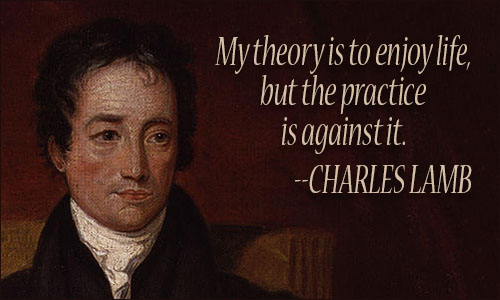CHARLES LAMB QUOTES II
English essayist and critic (1775-1834)

Notice: Undefined variable: id in /hermes/walnacweb03/walnacweb03ak/b2149/pow.notablequote/htdocs/l/includes/quoter.php on line 25
Time partially reconciles us to anything. I gradually became content--doggedly contented, as wild animals in cages.
CHARLES LAMB
Notice: Undefined variable: id in /hermes/walnacweb03/walnacweb03ak/b2149/pow.notablequote/htdocs/l/includes/quoter.php on line 35
"The Superannuated Man", Elia and The last essays of Elia
Notice: Undefined variable: id in /hermes/walnacweb03/walnacweb03ak/b2149/pow.notablequote/htdocs/l/includes/quoter.php on line 61
A pun is a pistol let off at the ear; not a feather to tickle the intellect.
CHARLES LAMB
"Popular Fallacies", Last Essays of Elia
Trample not on the ruins of a man.
CHARLES LAMB
"Confessions of a Drunkard", The Last Essays of Elia
Dehortations from the use of strong liquors have been the favourite topic of sober declaimers in all ages, and have been received with abundance of applause by water-drinking critics. But with the patient himself, the man that is to be cured, unfortunately their sound has seldom prevailed.
CHARLES LAMB
"Confessions of a Drunkard", The Last Essays of Elia
Milton almost requires a solemn service of music to be played before you enter upon him. But he brings his music, to which, who listens, had need bring docile thoughts and purged ears.
CHARLES LAMB
"On Books and Reading", The Last Essays of Elia
Your borrowers of books--those mutilators of collections, spoilers of the symmetry of shelves, and creators of odd volumes.
CHARLES LAMB
"The Two Races of Men", Essays of Elia
But besides Sundays I had a day at Easter, and a day at Christmas, with a full week in the summer to go and air myself in my native fields of Hertfordshire. This last was a great indulgence; and the prospect of its recurrence, I believe, alone kept me up through the year, and made my durance tolerable. But when the week came round, did the glittering fantom of the distance keep touch with me? Or rather was it not a series of seven uneasy days, spent in restless pursuit of pleasure, and a wearisome anxiety to find out how to make the most of them? Where was the quiet, where the promised rest? Before I had a taste of it, it was vanished. I was at the desk again, counting upon the fifty-one tedious weeks that must intervene before such another snatch would come.
CHARLES LAMB
Essays of Elia
I know that a sweet child is the sweetest thing in nature, not even excepting the delicate creatures which bear them.
CHARLES LAMB
"A Bachelor's Complaint", Elia and the Last Essays of Elia
Antiquity! thou wondrous charm, what art thou? that being nothing art everything? When thou wert, thou wert not antiquity -- then thou wert nothing, but hadst a remoter antiquity, as thou calledst it, to look back to with blind veneration; thou thyself being to thyself flat, jejune, modern! What mystery lurks in this retroversion? or what half Januses are we, that cannot look forward with the same idolatry with which we for ever revert! The mighty future is as nothing, being everything! the past is everything, being nothing!
CHARLES LAMB
"Oxford in the Vacation", Elia and the Last Essays of Elia
Shut not thy purse-strings always against painted distress. Act a charity sometimes. When a poor creature (outwardly and visibly such) comes before thee, do not stay to inquire whether the "seven small children," in whose name he implores thy assistance, have a veritable existence. Rake not into the bowels of unwelcome truth, to save a halfpenny. It is good to believe him.
CHARLES LAMB
"Decay of Beggars", Elia
It is with some violation of the imagination that we conceive of an actor belonging to the relations of private life, so closely do we identify these persons in our mind with the characters which they assume upon the stage.
CHARLES LAMB
attributed, Day's Collacon
My theory is to enjoy life, but the practice is against it.
CHARLES LAMB
letter to William Wordsworth, Mar. 20, 1822
I can scarce bring myself to believe, that I am admitted to a familiar correspondence, and all the license of friendship, with a man who writes blank verse like Milton.
CHARLES LAMB
letter to Samuel Taylor Coleridge, Feb. 13, 1797
There is a pleasure in affecting affectation.
CHARLES LAMB
"Table Talk", Works: Essays and Sketches
'Tis unpleasant to meet a beggar. It is painful to deny him; and, if you relieve him, it is so much out of your pocket.
CHARLES LAMB
"Table-Talk and Fragments of Criticism", The Life and Works of Charles Lamb
Friend of my bosom, thou more than a brother, Why wert thou not born in my father's dwelling?
CHARLES LAMB
The Collected Essays of Charles Lamb
Books think for me.
CHARLES LAMB
"Detached Thoughts on Books and Reading", Last Essays of Elia
The human species, according to the best theory I can form of it, is composed of two distinct races, the men who borrow, and the men who lend.
CHARLES LAMB
"The Two Races of Men", Essays of Elia
He might have proved a useful adjunct, if not an ornament to society.
CHARLES LAMB
Captain Starkey
A laugh is worth a hundred groans in any market.
CHARLES LAMB
Bon-Mots